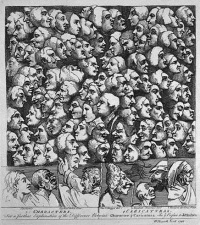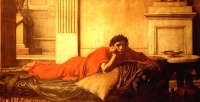Emotion
From The Art and Popular Culture Encyclopedia
| Revision as of 12:21, 23 January 2012 Jahsonic (Talk | contribs) ← Previous diff |
Revision as of 12:28, 23 January 2012 Jahsonic (Talk | contribs) Next diff → |
||
| Line 32: | Line 32: | ||
| ==See also== | ==See also== | ||
| * [[Affect measures]] | * [[Affect measures]] | ||
| - | * [[Affective Computing]] | ||
| - | * [[Affective forecasting]] | ||
| * [[Affective neuroscience]] | * [[Affective neuroscience]] | ||
| * [[Affective science]] | * [[Affective science]] | ||
| - | * [[CyberEmotions]] | ||
| * [[Emotion classification]] | * [[Emotion classification]] | ||
| * [[Emotion in animals]] | * [[Emotion in animals]] | ||
| Line 43: | Line 40: | ||
| * [[Emotional expression]] | * [[Emotional expression]] | ||
| * [[Feeling]] | * [[Feeling]] | ||
| - | * [[Fuzzy-trace theory]] | ||
| * [[Sex and emotion]] | * [[Sex and emotion]] | ||
| * [[Sociology of emotions]] | * [[Sociology of emotions]] | ||
| * [[Social neuroscience]] | * [[Social neuroscience]] | ||
| - | * [[Somatic markers hypothesis]] | ||
| - | * [[Affective science#Measuring Emotions]] | ||
| {{GFDL}} | {{GFDL}} | ||
Revision as of 12:28, 23 January 2012

|
Related e |
|
Featured: |
Emotion, in its most general definition, is an intense mental state that arises automatically in the nervous system rather than through conscious effort, and evokes either a positive or negative psychological response. An emotion is similar to a feeling.
Notable theorists
In the late 19th century, the most influential theorists were William James (1842–1910) and Carl Lange (1834–1900). James was an American psychologist and philosopher who wrote about educational psychology, psychology of religious experience/mysticism, and the philosophy of pragmatism. Lange was a Danish physician and psychologist. Working independently, they developed the James–Lange theory, a hypothesis on the origin and nature of emotions. The theory states that within human beings, as a response to experiences in the world, the autonomic nervous system creates physiological events such as muscular tension, a rise in heart rate, perspiration, and dryness of the mouth. Emotions, then, are feelings which come about as a result of these physiological changes, rather than being their cause.
Some of the most influential theorists on emotion from the 20th century have died in the last decade. They include Magda B. Arnold (1903–2002), an American psychologist who developed the appraisal theory of emotions; Richard Lazarus (1922–2002), an American psychologist who specialized in emotion and stress, especially in relation to cognition; Herbert Simon (1916–2001), who included emotions into decision making and artificial intelligence; Robert Plutchik (1928–2006), an American psychologist who developed a psychoevolutionary theory of emotion; Robert Zajonc (1923–2008) a Polish–American social psychologist who specialized in social and cognitive processes such as social facilitation. In addition, an American philosopher, Robert C. Solomon (1942–2007), contributed to the theories on the philosophy of emotions with books such as What Is An Emotion?: Classic and Contemporary Readings (Oxford, 2003).
Influential theorists who are still active include psychologists, neurologists, and philosophers including:
- Lisa Feldman Barrett – Social philosopher and psychologist specializing in affective science and human emotion.
- John Cacioppo – from the University of Chicago, founding father with Gary Berntson of social neuroscience.
- António Damásio (born 1944) – Portuguese behavioral neurologist and neuroscientist who works in the US
- Richard Davidson (born 1951) – American psychologist and neuroscientist; pioneer in affective neuroscience.
- Paul Ekman (born 1934) – Psychologist specializing in study of emotions and their relation to facial expressions
- Barbara Fredrickson – Social psychologist who specializes in emotions and positive psychology.
- Nico Frijda (born 1927) – Dutch psychologist who specializes in human emotions, especially facial expressions
- Peter Goldie – British philosopher who specializes in ethics, aesthetics, emotion, mood and character
- Arlie Russell Hochschild (born 1940) – American sociologist whose central contribution was in forging a link between the subcutaneous flow of emotion in social life and the larger trends set loose by modern capitalism within organizations.
- Joseph E. LeDoux (born 1949) – American neuroscientist who studies the biological underpinnings of memory and emotion, especially the mechanisms of fear
- George Mandler (born 1924) - American psychologist who wrote influential books on cognition and emotion
- Jaak Panksepp (born 1943) – Estonian-born American psychologist, psychobiologist and neuroscientist; pioneer in affective neuroscience.
- Jesse Prinz – American philosopher who specializes in emotion, moral psychology, aesthetics and consciousness
- Klaus Scherer (born 1943) – Swiss psychologist and director of the Swiss Center for Affective Sciences in Geneva; he specializes in the psychology of emotion
- Ronald de Sousa (born 1940) – English–Canadian philosopher who specializes in the philosophy of emotions, philosophy of mind and philosophy of biology.
See also
- Affect measures
- Affective neuroscience
- Affective science
- Emotion classification
- Emotion in animals
- Emotions and culture
- Emotion and memory
- Emotional expression
- Feeling
- Sex and emotion
- Sociology of emotions
- Social neuroscience



